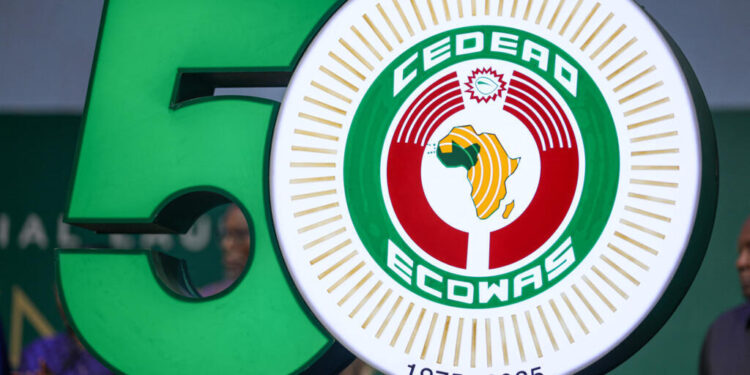The Economic Community of West African States (ECOWAS) marks its golden jubilee this year. The milestone offers a moment for reflection—not only on the regional bloc’s collective journey, but also on the individual contributions of its founding members. Ghana, a trailblazer in West African diplomacy and integration, has played a central role in shaping ECOWAS’ direction over the decades. This editorial explores Ghana’s participation in the regional organisation in defining its achievements, enduring challenges, and what the future might hold as ECOWAS grapples with internal dissent, political instability, and questions over its relevance.
ECOWAS was established by the Heads of State and Government of the fifteen West African Countries on the 28th of May 1975 in Lagos, Nigeria. On January 29, 2025, Burkina Faso, Mali and Niger officially withdrew from ECOWAS. The remaining twelve (12) ECOWAS members are Benin, Cape Verde, Côte d’Ivoire, Gambia, Ghana, Guinea, Guinea-Bissau, Liberia, Nigeria, Sierra Leone, Sénégal and Togo.
The ECOWAS Secretariat became a Commission in 2017, headed by a President, who is assisted by a Vice President, five Commissioners and the Auditor-General of ECOWAS Institutions. This change was considered a part of a renewal process aimed at deepening cohesion and eliminating barriers to integration.
Ghana, a key member has always aligned itself with the Community’s key objectives of promoting cooperation and integration, ensuring peace, economic growth and stability within the sub-region.
Over the fifty-year period, ECOWAS has sought to achieve the following key goals that will improve the lives of its inhabitants.
Free Movement and Regional Integration
The ECOWAS protocol on Free Movement of Persons, Goods, and Services grants citizens the right to reside and work in any member state without a visa. While ECOWAS believes that this initiative has fostered a common market of nearly 400 million people and facilitated trade and cultural exchanges across the region, challenges exist relative, among others, to competition and dominance by some member states. Increasingly, there have been attacks on some member citizens in other countries, citing unfair competition and labour practices.
- Peace and Security Initiatives
ECOWAS’ role in the maintenance of peace and security has been exemplary in many instances, particularly in Liberia. It is recalled that the ECOWAS Monitoring Group (ECOMOG) has played a significant role in leading peace initiatives in Liberia and Sierra Leone during the 1990s. The establishment of the ECOWAS Standby Force (ESF) is to respond to security threats, while the Early Warning System (ECOWARN) anticipates potential conflicts. Similarly, key initiatives such as the Accra Initiative helped to ensure collaboration and cooperation in intelligence sharing and combatting extremism within the region. However, the overall success of ECOWAS in maintaining peace and security has been severely undermined by lack of adequate funding and economic challenges facing member states. This notwithstanding, regular meetings among security chiefs within the ECOWAS framework has been instrumental in facilitating information sharing and joint security operations whenever necessary.
- Economic Integration and Trade Liberalization
ECOWAS also introduced the ECOWAS Trade Liberalization Scheme (ETLS) and the Common External Tariff (CET) as measures to improve trade and engender free movement of goods. The ETLS guarantees the free movement of goods originating from within the ECOWAS region without the payment of duties and taxes. It also addresses the issue of “rules of origin,” ensuring that products from third countries do not benefit from duty-free treatment within the community. The challenge though, has been that while the ETLS looks excellent on paper, there have been complaints particularly from businesspersons of harassment at the borders and entry points of the various countries from officials of individual states.
- Human Capital Development
ECOWAS has invested in human capital through initiatives in education, health, and youth empowerment. Programs like the West African Health Organization (WAHO) have addressed public health challenges, including the Ebola and COVID-19 outbreaks. ECOWAS also provided opportunities for young volunteers to serve in countries where teachers and health workers were most needed. Again, these initiatives have been undermined by a lack of adequate funding which has tended to limit the scope and sustainability of these programmes.
Energy and Infrastructure Projects
ECOWAS’ efforts at ensuring integrated energy sources for collective use over the last 50 years are commendable. The West Africa Power Pool (WAPP) aims to integrate the region’s power systems, providing reliable energy to citizens. Projects like the West Africa Gas Pipeline (WAGP) and the ECOWAS Centre for Renewable Energy and Energy Efficiency are some of the success stories. As has been the case with most initiatives, the implementation of these laudable projects has not been as fast as expected.
- Promotion of Democracy and Governance
The promotion of democracy and governance has been one of ECOWAS’ top priorities. It has been active in monitoring elections and facilitating peaceful transitions of power. Its diplomatic efforts have been crucial in resolving political crises. It has, however, not always been successful in this effort as its standby force is not fully operational, and the diplomatic route has not always yielded the expected outcomes. A case in point is its failure to bring Mali, Niger and Burkina Faso back to the ECOWAS table.
While ECOWAS has achieved some notable successes over the 50 years, it faces significant challenges going forward. These include political instability and the recent withdrawal of some member states. Some of its key shortcomings include the following;
- Ineffectiveness in Preventing and Addressing Military Coups
- Internal Divisions and Political Tensions, particularly between Anglophone and Francophone countries
- Financial Mismanagement and Lack of Accountability
- Failure to Prevent Member States’ Withdrawal
- Limited Impact on Socioeconomic Development
- Undermining of free movement by officials at the borders
- Limited investments in road transport and rail infrastructure.
These challenges underscore the need for ECOWAS to undertake comprehensive reforms to enhance its effectiveness, accountability, and ability to foster regional unity and development.
Ghana, a founding member of ECOWAS may need to reconsider its membership of the organisation. Some Ghanaians are asking whether there are tangible benefits for continued membership of a body that is facing serious integration challenges.
CISA believes that Ghana needs to remain in ECOWAS. The benefits for remaining far outweigh the challenges. It is necessary for Ghana to deepen its collaboration in the areas of intelligence gathering, security and information sharing, early warning, trade and economic development.
While the precedent set by the three Sahelian states (Burkina Faso, Niger & Mali) was occasioned by their peculiar challenges, they would need to walk a very tight rope to ensure they are not ensnared into a relationship that keeps them subjugated to any foreign power. Their biggest market continues to be ECOWAS, and their eventual integration is highly anticipated, particularly by Ghana. Going forward, Ghana must therefore continue to see its continued membership of ECOWAS as critical and work towards having a stronger voice in determining the future of the organisation over the next 50 years. This must be done through active support of the organisation’s activities, providing its young nurses, teachers and engineers with experiences in other ECOWAS countries to undertake national service, and working towards the achievement of integration in rail, road and air transport and related digital services.































